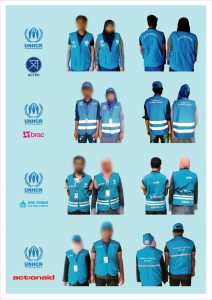Who can help me get information in the camps?
If you need help to access these information points, please approach the Site Management staff or volunteers, or the Community Outreach Members (COMs) in your camp. You can identify a volunteer by their vest, and you can ask to see their ID card to confirm their identity. See the below picture of Community Outreach Members as an example.

When will I be able to get a new SMART card?
UNHCR is aware that most individual identity cards were printed and issued between 2018 and 2020 and that a large portion of them are now torn, defaced or illegible due to wear and tear from ordinary use. Furthermore, children turning twelve years who are eligible to receive the cards have not systematically been issued the cards since December 2019.
UNHCR intends to discuss with the refugee community mechanisms under which the identity cards can be systematically issued and will communicate plans on this in due course.
The QR code on my SMART card is bigger compared to what was on cards previously issued to me by UNHCR. Is my new card genuine?
Yes. Your card is genuine. This is the new format adopted by UNHCR. It will not affect any protection and assistance offered to you and your family and has no impact on your status or registration with UNHCR.
I have requested an appointment with UNHCR to update my family or my personal data, but I haven’t received one yet. What should I do?
Because of COVID-19 restrictions from March 2020 until mid-2022, for a long time many people were not able to get appointments to update their data, which means that there is a waiting list. UNHCR recently revised the scheduling process to reduce the waiting list and make the waiting time shorter. However, for now, only some types of requests will be given appointments.
Your request will not be prioritized for appointments for now if it is about:
- Damaged cards,
- Changes in basic biodata such as names and ages.
If your request is about:
- Lost or destroyed cards,
- Adding a new family member,
You can approach the nearest CRFM desk or Information Service center (ISC) to get an appointment with Registration team (see Information, Complaints and Feedback points), or call the UNHCR toll-free line 16670.
Be aware that you will need to present some documents in order to go through with these requests – you can get details of exactly which documents you need at the CFRM Desk or ISC (see Information, Complaints and Feedback points).
I have relocated to a new camp. How will I be able to access food and other assistance?
Any relocation from one camp to another has to be approved by the CiCs of both camps and be supported by the Site Management Support (SMS) agencies. If you have been authorized to relocate, the SMS agency in your camp will send your details to UNHCR’s registration team, and UNHCR will update your new address and issue new documentation to allow you to access food and other assistance in your new camp. You will be scheduled for an appointment at the Registration Centre to receive your new document.
Can I return to Myanmar?
UNHCR assesses that conditions in Rakhine State are currently not conducive to the sustainable return of Rohingya refugees. However, every refugee has a right to return to his or her home.
Can I apply to UNHCR for resettlement to another country?
UNHCR does not consider general letters or emails from individuals in relation to resettlement. Anyone offering services for you to apply or to expedite resettlement is involved in a fraudulent scheme and should be reported (see Reporting Fraud and Misconduct section below, or email [email protected]).
Resettlement is one of three possible durable solutions (in addition to voluntary repatriation and local integration). It involves a voluntary transfer from the first country to which a refugee has fled to another country which has assessed the refugee and agreed to admit the individual/family. Resettlement is only available for a fraction of the world’s refugees – less than 1% of refugees worldwide are ever resettled.
Resettlement is not a right and registration with UNHCR does not mean an individual will be referred for resettlement. Resettlement remains a protection tool for highly vulnerable refugees and consideration for potential resettlement submission is based on individual protection needs. Final decisions on resettlement applications are made by the country of resettlement, not by UNHCR. UNHCR has no ability to influence these decisions.
UNHCR identifies individuals for resettlement through a range of tools and methods such as the UNHCR database. Those identified are required to go through an interview process. Identification of individuals for resettlement does not involve UNHCR field or protection staff. Please also note that resettlement countries screen and decide which refugees to accept. UNHCR is not involved in their decision-making process in any way.
See also:
Legal Assistance | Training & Learning New Skills | Education
